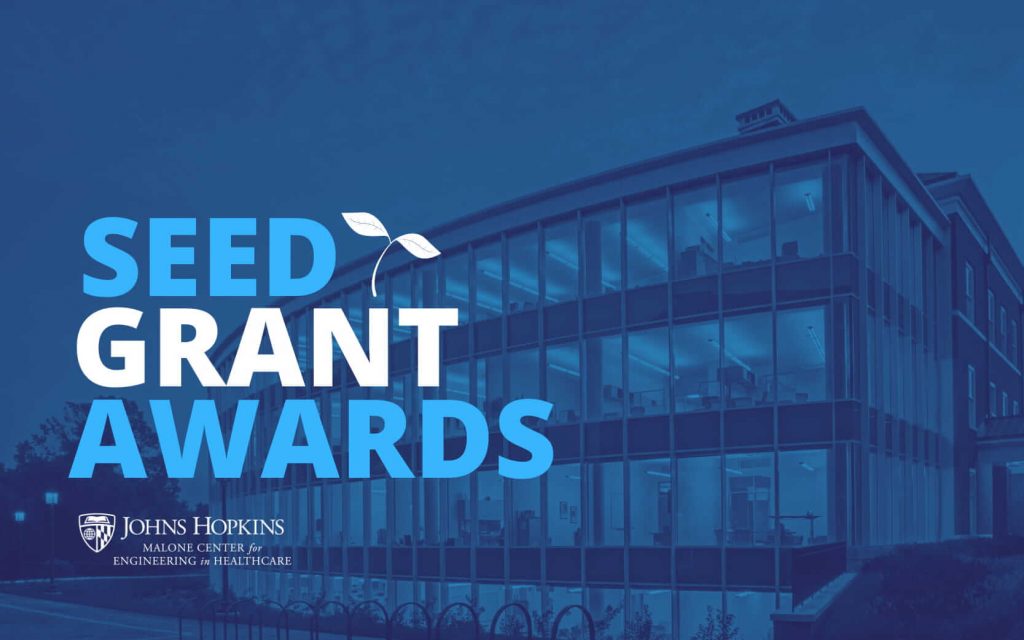The Malone Center for Engineering in Healthcare recently awarded grants through the center’s Seed Grant Program. The new grants support engineering innovations that aim to:
- Predict the effectiveness of endotherapy for chronic pancreatitis patients;
- Transform surgical robots into collaborative and intelligent assistants; and
- Develop a data-powered, automated tool to modernize the management of fall risks.
With the funding for this round of projects, the center will have awarded a total of 15 seed grants since the program’s inception in 2018. To learn about the past projects, visit the Malone Seed Grant page.
The Malone Center will fund the following three projects:
A Computation and Physics-Informed Deep Learning Method for Predicting Response to Endotherapy in Patients with Chronic Pancreatitis
Research Team: Rajat Mittal (Mechanical Engineering/Malone); Venkata Akshintala (Gastroenterology); Jung-Hee Seo (Mechanical Engineering)
Chronic pancreatitis, which results in debilitating abdominal pain, can be caused by pancreatic ductal hypertension (PDH) or by neuropathy. While endotherapy and surgery can relieve PDH, these methods have little effect on neuropathic pancreatitis. Therefore, limiting endotherapy to patients who may actually benefit from the procedure (i.e., their chronic pancreatitis is caused by PDH) would significantly advance the treatment of this condition. However, screening for PDH requires the measurement of the pancreatic ductal pressure, and there is currently no available technology that can make this measurement.
This research team has been developing a novel, non-invasive in silico tool based on magnetic resonance cholangiopancreatography imaging to predict pancreatic ductal pressure. With this seed grant, the team aims to refine and validate its method via a prospective small-cohort, multi-center study. The team will also accelerate pancreatic ductal pressure prediction by leveraging physics-informed deep learning. In the long term, the data from this pilot study will form the basis for a definitive clinical trial that evaluates the role of pancreatic ductal pressure estimation via in silico modeling in predicting the response to endotherapy among chronic pancreatitis patients.
Foundation Models of Surgical Activity for Agent-Based Automation and Human-Machine Teaming in Robotic Surgery
Research Team: Mathias Unberath (Computer Science/Ophthalmology/Malone); Axel Krieger (Mechanical Engineering/Malone); Gina Adrales (Department of Surgery/Malone)
The long-term goal of this project is to transform surgical robots from elaborate yet inane tools into collaborative and intelligent assistants. This transformation becomes possible through the development of foundation model-based synthetic agents that offer rich interfaces to surgical context and surgeon’s commands and are capable of chain-of-thought reasoning to control robot behavior.
Trained in realistic simulations, the research team’s envisioned agent will learn to translate natural language commands and endoscopic visual inputs into surgical action sequences, enabling surgical task automation. Furthermore, this agent will enable human-machine teaming in a closed-loop framework, allowing it to re-plan action sequences based on evolving scenes and new commands. The team will enable its agent, trained via simulation, to perform on real surgical robotics data from the da Vinci Research Kit via Sim2Real transfer, before validating its proposed approach for human-machine teaming and surgical autonomy in peg-transfer tasks, both virtually and by controlling a physical surgical robot.
This innovative approach to human-machine teaming for surgical automation has the potential to transform surgical robotics by offering intelligent assistance that could improve surgical precision and efficacy, and ultimately, patient outcomes. In addition to inciting new collaborations among Malone Center affiliates, this project will generate the preliminary data for a follow-on proposal to the National Science Foundation’s Mind, Machine and Motor Nexus Program.
FALLPRO: Fall Prevention and Risk Optimization Tool
Research Team: Kimia Ghobadi (Civil and Systems Engineering/Malone); Erik Hoyer (Physical Medicine and Rehabilitation)
The goal of this work is to modernize the management of fall risks in hospitalized patients by developing a data-powered, automated tool called FALLPRO (Fall Prevention and Risk Optimization). FALLPRO will utilize electronic health record data for the purpose of dynamic fall risk assessment and prevention. Recognizing that current manual and subjective methods are time-consuming and prone to errors, FALLPRO will use a data-driven approach, leveraging machine learning methods and mixed-integer optimization models. By accurately assessing risk factors and optimizing prevention strategies on a daily basis, the tool seeks to enhance nursing efficiency, improve patient safety, and reduce fall-related injuries and healthcare costs.
The interdisciplinary team behind this initiative plans to develop a comprehensive model that not only advances the precision of fall risk evaluations, but also prioritizes individualized interventions, ensuring more targeted and effective fall prevention. Validating this tool against existing practices, this project will enable a significant step forward in patient care, aiming to reduce nursing load, improve standardization, and explore adaptation to various care environments and populations, such as older adults or individuals with impaired cognition.
The Malone Center Seed Grant Program aims to assist faculty and research staff with development of innovative, collaborative proposals that will advance the Malone Center mission. New partnerships and research directions are often achieved, opening up opportunities that may otherwise not come to fruition.
